| |
|
Links and Resources
Other Articles on this Site
River Diagrams and Trigram Cycles of the I Ching
According to legend, these mystic diagrams were gifted by magic animals to Chinese sage-kings of ancient times, and served as the architecture for the I Ching.
Web Links
The I Ching, tr. James Legge
For those who want to see James Legge's translation of the I Ching in its original ordering and format. Legge's translation is probably the only complete I Ching translation that is legally available on the Web.
Yijing Dao, by S. J. Marshall
Reviews, links and an assortment of interesting articles, all very knowledgeable.
Writings, by Joseph A. Adler
Articles by a noted Sinologist and student of Chinese philosophy. The article called Zhu Xi and Divination forms a good background for his published translation of Chu Hsi's Introduction to the Study of the Classic of Change (I-hsüeh ch'i-meng).
Contemplating the I Ching, by Barbara Davis
A number of useful resources, including I Ching diagrams, news and reviews, FAQ and basic instructions.
I Ching Translations: Traditionalist
Traditionalist translations view the I Ching through the lens of the "Confucian" Ten Wings commentaries of Han Dynasty times, along with many centuries' accumulation of interpretive tools and commentaries in China. This is the I Ching as it was first introduced in the West and as it is generally known and used around the world: as a book of wisdom and spiritual guidance working through oracular means.

|
Richard Wilhelm and Cary F. Baynes, The I Ching, or Book of Changes
The most celebrated and influential edition, and the first to become famous in the West. One of the few complete translations, including the full text of all ten wings. |
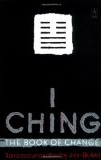 |
John Blofeld, I Ching: Book of Change
A more concise and easy-to-consult (but literal) translation by a likeable writer, known for his books on Buddhist and Taoist topics. |
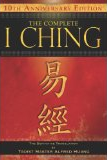 |
Alfred Huang, The Complete I Ching - 10th Anniversary Edition: The Definitive Translation
A popular recent edition with long commentaries by a Tai Chi Chuan teacher who grew up in China. Despite the title, it is not a complete edition because it does not contain some of the Ten Wings. |
I Ching Translations: Historicist
Historicist translations are inspired by the work of modern Chinese scholars who have attempted to rediscover the original meaning of the oldest core portions of the I Ching, the hexagram judgments and line texts (called the Zhouyi), as they were understood in early Zhou dynasty times. The later "Confucian" Ten Wings are not used for interpretation; instead, historicist scholars study texts and archaeological finds that are, as nearly as possible, contemporaneous with or earlier than the Zhouyi text itself. The most extreme of such scholars view that Zhouyi as lacking philosophical, spiritual, or structural interest, instead being devoted to simply giving indications of the likely success or failure of planned invasions, dynastic marriages, and human sacrifices.
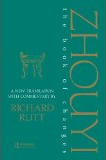 |
Richard Rutt, Zhouyi: A New Translation with Commentary of the Book of Changes
A formidable work of scholarship with a wealth of historical and introductory material. The translation is very choppy and obscure, with few suggestions for interpretation, but much use of folksy rhymes that give it an archaic feel. Also includes the complete "Confucian" Ten Wings commentaries as appendices, separate from the main translation. |
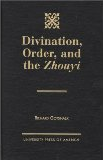 |
Richard Gotshalk, Divination, Order, and the Zhouyi
A scholarly version written from a similar general viewpoint to Rutt, except that Gotshalk perceives a lot of patterns of related meanings between hexagrams and between hexagram lines. Gotshalk also emends the received Chinese text in many places due to his analysis that copying errors corrupted the original text. |
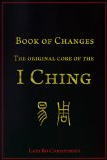 |
Lars Bo Christensen, Book of Changes - The Original Core of the I Ching
An unusual work that presents the translation in two versions: one with vocabulary notes about many of the key terms, and another with a helpful, proverb-like statement by the author appended to clarify the meaning of each line. I find the author's commentary very interesting and helpful. |
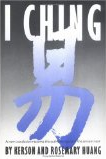 |
Kerson and Rosemary Huang, I Ching
A translation of the Zhouyi by a physicist and a poet, who supply their personal commentary. |
I Ching Translations: Mixed Traditional/Historical
 |
John Minford, I Ching: The Essential Translation of the Ancient Chinese Oracle and Book of Wisdom
Minford is a noted translator of Chinese literature. Two separate translations, one traditionalist and one historicist, form parts I and II of this volume. Oddly, Minford duplicates selected phrases into Latin, apparently to make them more magical and impressive-sounding. |
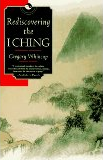 |
Gregory Whincup, Rediscovering the I Ching
A mostly historicist version that nevertheless draws upon the trigrams to help interpret the hexagrams, although many historicists regard the trigrams as being of later date. Like Gotshalk, Whincup is prone to see stories in the I Ching, but not the same stories that Gotshalk sees. |
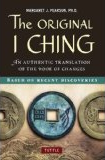 |
Margaret J. Pearson, The Original I Ching: An Authentic Translation of the Book of Changes
Another historicist version, but one that also draws upon the Images portion of the later Ten Wings commentaries. |
Commentaries, Histories, and Reference
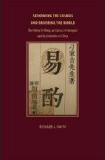 |
Richard J. Smith, Fathoming the Cosmos and Ordering the World: The Yijing (I Ching, or Classic of Changes) and Its Evolution in China
A history of thinking about the I Ching in China that discusses the many scholars who introduced new interpretive ideas over the centuries. Valuable for understanding that the ideas promoted in Richard Wilhelm's and Alfred Huang's commentaries did not originate from a single set of wise "ancients," but actually evolved over a long period of time. |
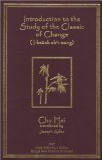 |
Chu Hsi (translated by Joseph Adler), Introduction to the Study of the Classic of Change
A Song Dynasty study of the I Ching by one of China's most influential philosophers. Chapters cover the River Chart (He Tu) and Lo Shu diagrams, the trigrams and their Before Heaven and After Heaven sequences, and an explanation of how to use the yarrow stalks to cast a reading. |
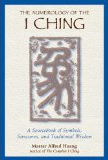 |
Alfred Huang, The Numerology of the I Ching: A Sourcebook of Symbols, Structures, and Traditional Wisdom
Covers many interesting ideas about the hexagram, trigram, and line structure, the He Tu and Lo Shu diagrams, and numerological patterns in the I Ching. For the most part, does not identify the historical sources of these ideas. |
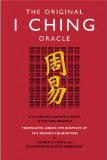 |
Rudolf Ritsema, The Original I Ching Oracle: The Pure and Complete Texts with Concordance
A word-for-word translation that makes no connected verbal sense, but is collated with a glossary that would be interesting to amateurs who want to translate or interpret the I Ching themselves. The word meanings seem to be those that would be understood by Han Dynasty and later commentators, and often do not include those that would be chosen by historicist scholars. |
|
|













